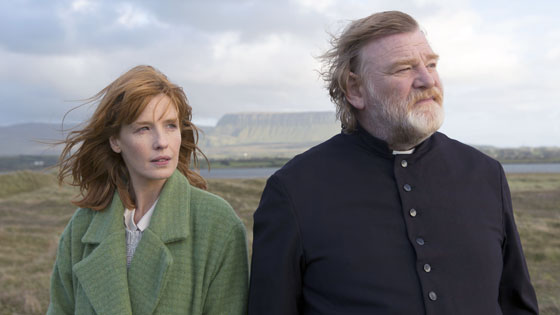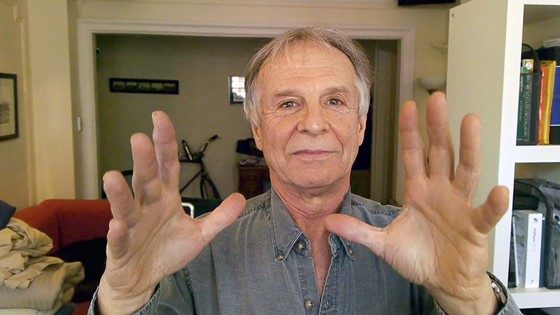Calvary
Calvary opens brilliantly, as a priest named Father James listens to an adult male in the confession; however, this man is not confessing his sins but rather indicting the church and religion. He tells Father James in upsetting detail of the many times his local priest molested him as a child. This anonymous man continues that he will kill Father James in seven days on next Sunday (of course Sunday); not because Father James is bad, but because he is the only one who is genuinely good.
Director John Michael McDonagh, whose debut feature The Guard is a personal favorite, spends Calvary following Father James around County Sligo in Ireland, as he mulls over his faith through encounters with his suicidal daughter, and the local townspeople. The film walks through the indiscretions of the locals through the perspective of Father James’ rapidly diminishing faith. By opening with a confession of child molestation, belief in God is immediately put into question. How can such a thing ever happen, especially in a church through an agent of God? At a certain point, I began wondering if the biggest sinner is the priest. He who implores adults, through guilt, to believe in a higher power who would allow such a horrible event to occur not once but many times. How can he use guilt to convince people to believe in the seemingly absurd fallacy of God?
While these intriguing thoughts were brought on by Calvary, it also contradicted them. McDonagh reifies religion and the notion of faith when Father James gives emotional support to a grieving woman whose loved one died tragically. The moment is a triumph for both of them, she is emotionally healed and strengthen by this moment. It is visually and sonically portrayed in a romantic, loving way (warm light, “heart-warming moment” music). Thus, the film seems to have affection for this moment and its implications. It could be McDonagh’s attempt to bring a rounded complexity and nuance to the film’s musings on the morality of the church, but it felt out of place and silly in a film that is mostly filled with overwhelming darkness.
Moments, like the opening, will stay with me and live in the darker part of my heart. And the direction is unsurprisingly strong, with a skillful sense of blocking, timing and poetic imagery (the ocean is depicted quite beautifully at times). However, McDonagh’s confusingly unclear intentions about the themes of the film keep me at a distance from Calvary.
Grade: B
One Cut, One Life
Two documentary filmmakers, Lucia Small and Ed Pincus, turn the camera on themselves when Pincus is diagnosed with a terminal illness. As many audience members remarked in the Q+A, this film is not about death; it’s about learning, or being reminded of, how to live. When the credits rolled, and as I typed these words, the tears are unstoppable.
This film isn’t just about Pincus’ slow death. Before he was diagnosed, Small had already experienced two sudden, violent deaths of friends. With these three life tragedies surrounding her, the film’s focus became the frailty of life. Small and Pincus then insightfully brought their camera down to the subway, visually illustrating their ordinariness by watching Pincus sit as just another passenger. Anything can happen to anyone, anytime. Perhaps someone else on that train is about to have a loved one commit suicide, or another may be abused by their spouse, or another may be showing early signs of cancer. As you watch the passersby on the subway, it doesn’t feel ham-fisted like you may be worrying, but like tragic moments of truth.
There are a lot of layers to One Cut, One Life, but I’m not going to go all through of them. I will tell you that Lucia Small’s individual introduction on stage will tell you where the film is headed, and when the moment comes, so do the tears of every loved one you’ve lost. However I must also tell you, that while there is darkness, the film leaves you with a rediscovered understanding of the beauty of life and how to live it with vigor.
This is why I go to the movies, to experience humanity in a way that is both authentic and illuminating. One Cut, One Life certainly brings that in spades.
Grade: A/A-


 RSS Feed
RSS Feed
